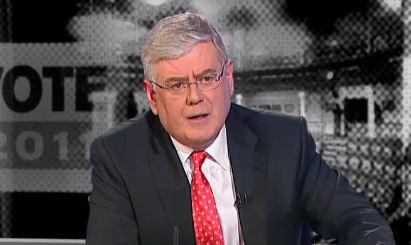Online broadcasting exempt from BAI election rules

The media-led argument about the leaders' debate – should it happen? Who should take part? – has spun off some interesting points about the broadcasting restrictions (and exemptions) on party political material. By Angela Long
We might all be watching filmed material on the internet every day, but the colour and movement there has not come within the beady eye of the regulator as regards political balance.
[Pictured: Labour leader Eamon Gilmore during last night's debate on TV3]
Websites are not covered by the black-out on election broadcasts which is enforced from 2pm on the day before polling. The Broadcasting Authority of Ireland (BAI) has confirmed this to Politico.
All parties are supposed to have equal time on the airwaves in the run-up to an election – but does that mean the opportunity for broadcast, or actual airtime?
And if a candidate's video plays on the internet, doesn't this contravene the no-fly zone of the last 17 hours or so before polling stations open? For example, the very contemporary offering by Dylan Haskins, the youthful independent in the Dublin South East constituency or the more weighty and ponderous efforts by Enda Kenny on the Fine Gael website.
The first issue came up after TV3 said it fulfils the legal requirement by offering airtime to all parties. If individual candidates refuse the invitation, they have declined a chance to put their case.
The Broadcasting Authority of Ireland has just modified its rules on pre-election broadcasts. The authority recently announced it would be permit radio and television to cover election-related material until 2pm on the day before polling (Friday, February 25).
Earlier this year TV3 made a submission to the BAI that the previous rule, of a cessation of broadcast at 12 midnight the day before polling was inappropriate.
Other media do not suffer (or possibly it is the readers who are suffering at that stage) the same last-minute ban.
An emerging anomaly is the exclusion of online media from the moratorium. If a website carries video, does this contravene the rule? Apparently not – the new-fangled internet has not come under the scrutiny of the Irish regulator.
Print media and foreign media available in Ireland (such as the BBC, CNN, Channel Four News) are also exempt.
Perhaps voters are so saturated with the competing arguments by the time of polling, it is only merciful to give them time to think.
Too much information does not always work. In the run-up to the first Lisbon Treaty referendum, The Irish Times took its democratic responsibility very seriously. Every day, there were five or more pages rehearsing the various arguments for and against a yes note. Despite the paper's underlying support for the Treaty (made clear in previous articles and editorials), all parties, even those deemed on the lunatic fringe by the political establishment, were given ample space. Senior editors, in private conversations, made it clear that they felt common sense would prevail and Europe would again get the nod.
However the Irish public rudely rebuffed the proposition at the first poll in June 2008, by a margin of 53.4% to 46.6% - a clear enough margin.
The repeat referendum in October 2009, when the recession was chilling people's bones, resulted in a two-thirds majority (67%) in favour.
There is no limit to how many pages, screens, film clips and graphs that the online and paper media can produce. It is up to their editors' sense of how much the audience will take before they turn-off.
This is a judgment call which should be dispassionate and objective.
The BAI's rules on the election 'black-out' can be downloaded from this link.
Commercial broadcaster TV3 is at http://www.tv3.ie/
